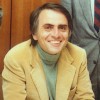 | Carl SaganAmerican astronomer, astrophysicist, cosmologist, author |
Imagination will often carry us to worlds that never were, but without it we go nowhere.
Science is an ongoing process. It never ends. There is no single ultimate truth to be achieved, after which all the scientists can retire. And because this is so, the world is far more interesting, both for the scientists and for the millions of people in every nation who, while not professional scientists, are deeply interested in the methods and findings of science.
What does seventy million years mean to beings who live only one-millionth as long? We are like butterflies who flutter for a day and think it is forever.
The method of science, as stodgy and grumpy as it may seem, is far more important than the findings of science.
Claims that cannot be tested, assertions immune to disproof are veridically worthless, whatever value they may have in inspiring us or in exciting our sense of wonder.
Keeping an open mind is a virtue - but, as the space engineer James Oberg once said, not so open that your brains fall out. Of course we must be willing to change our minds when warranted by new evidence. But the evidence must be strong.
The nitrogen in our DNA, the calcium in our teeth, the iron in our blood, the carbon in our apple pies were made in the interiors of collapsing stars. We are made of starstuff.
Science is not only compatible with spirituality; it is a profound source of spirituality.
For me, it is far better to grasp the Universe as it really is than to persist in delusion, however satisfying and reassuring.
Think of how many religions attempt to validate themselves with prophecy. Think of how many people rely on these prophecies, however vague, however unfulfilled, to support or prop up their beliefs. Yet has there ever been a religion with the prophetic accuracy and reliability of science? There isn't a religion on the planet that doesn't long for a comparable ability - precise, and repeatedly demonstrated before committed skeptics - to foretell future events. No other human institution comes close.
A central lesson of science is that to understand complex issues (or even simple ones), we must try to free our minds of dogma and to guarantee the freedom to publish, to contradict, and to experiment. Arguments from authority are unacceptable.